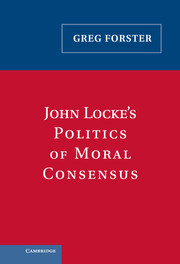Book contents
- Frontmatter
- Contents
- Acknowledgments
- List of Abbreviations
- John Locke's Politics of Moral Consensus
- 1 “Reason Teaches All Mankind, Who Will But Consult It”: John Locke and Moral Consensus
- 2 “Sit Down in Quiet Ignorance”: Locke's Epistemology of Limits
- 3 “The Candle of the Lord”: Locke's Rational Faith
- 4 “The Only Foundation of Faith”: Reasonable Christianity
- 5 “The Only True Touchstone of Moral Rectitude”: The Religious Foundations of Morality
- 6 “'Tis Reasonable to Think the Cause Is Natural”: Locke's Religious Eudemonism
- 7 “The Servants of One Sovereign Master”: Authority and Moral Consensus
- 8 “The Opinion of This or That Philosopher Was of No Authority”: Locke and Us
- Notes
- Bibliography
- Index
4 - “The Only Foundation of Faith”: Reasonable Christianity
Published online by Cambridge University Press: 17 August 2009
- Frontmatter
- Contents
- Acknowledgments
- List of Abbreviations
- John Locke's Politics of Moral Consensus
- 1 “Reason Teaches All Mankind, Who Will But Consult It”: John Locke and Moral Consensus
- 2 “Sit Down in Quiet Ignorance”: Locke's Epistemology of Limits
- 3 “The Candle of the Lord”: Locke's Rational Faith
- 4 “The Only Foundation of Faith”: Reasonable Christianity
- 5 “The Only True Touchstone of Moral Rectitude”: The Religious Foundations of Morality
- 6 “'Tis Reasonable to Think the Cause Is Natural”: Locke's Religious Eudemonism
- 7 “The Servants of One Sovereign Master”: Authority and Moral Consensus
- 8 “The Opinion of This or That Philosopher Was of No Authority”: Locke and Us
- Notes
- Bibliography
- Index
Summary
At the end of his life Locke became more intensely interested in religion. After the publication of the Essay Concerning Human Understanding, the Two Treatises of Government, and the Letter Concerning Toleration in 1689 – “Locke's annus mirabilis,” as Peter Nidditch calls it – he returned to England with the triumphant Whig expatriates and took a job as Commissioner of Excise Appeals. Later he was appointed to the Board of Trade. The political aspect of the great conflict between Anglicans and Puritans had largely been put to rest, and his public duties demanded only a small fraction of his prolific output, so Locke was able to concentrate his intellectual power on other matters. He made only minor revisions to the Two Treatises and published only one other major work in a related field, a tract on economics in 1691.
Religion came to dominate Locke's intellectual life. The only political issue outside of his professional duties in which he continued to take an active hand was the most distinctively religious political issue: toleration. In addition to publishing several more letters on the subject, he used his influence at court to assist the successful movement for greater toleration in the postrevolutionary government. And he published a series of major works about religion and related topics: a book on education stressing moral virtue in 1693, his theological masterpiece The Reasonableness of Christianity in 1695, a series of letters after 1695 defending both the Essay and the Reasonableness against religious critics, new editions of the Essay in 1694, 1695, and 1700 that considerably expanded sections on topics of religious interest, and – posthumously – a tract on the moral duty to examine one's beliefs, a short essay on miracles, and a lengthy exposition of the contents of Paul's epistles.
- Type
- Chapter
- Information
- John Locke's Politics of Moral Consensus , pp. 128 - 166Publisher: Cambridge University PressPrint publication year: 2005



